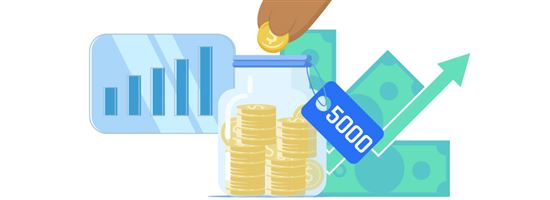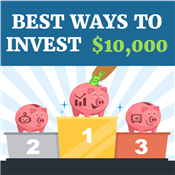The Best Way to Invest $5,000
Ad Disclosure: This article contains references to products from our partners. We may receive compensation if you apply or shop through links in our content. This compensation may impact how and where products appear on this site. You help support CreditDonkey by using our links.
Got $5,000 to invest? The right strategy can turn it into long-term wealth. Here's how you can make the most out of your money based on your goals.
 |
| © CreditDonkey |
Here are the best 11 ways you could invest and grow your $5,000:
- Boost your retirement savings
- Buy stocks for long-term growth
- Diversify with ETFs for stability
- Use mutual funds for managed growth
- Balance your portfolio with bonds
- Automate investing with robo-advisors
- Build wealth through real estate
- Explore cryptocurrency for high risk/reward
- Secure fixed returns with a CD
- Earn steady interest in a HYSA
- Save for college with a 529 Plan
The right investment can turn $5,000 into long-term wealth. Picking the best option depends on your financial goals, risk tolerance, and timeline.
This guide breaks down the best ways to invest $5,000, from stocks and real estate to high-yield savings accounts and retirement plans. You'll also learn which investments to avoid and how to maximize returns while minimizing risk.
Invest in Real Estate with $10+
- Only $10 minimum investment
- Get a diversified portfolio of real estate projects across the US
- Open to all investors
Before You Start Investing
Investing is important, but it shouldn't come before financial stability. Before putting $5,000 into the market, focus on these three key areas:
- Pay off high-interest debt
Prioritize paying off high-interest debt, like unpaid credit cards, over those with a lower interest rate, like mortgages. This way, you'll avoid a negative net cash flow, since typical investment returns are lower than high-interest debt costs. - Build an emergency fund
An emergency fund acts as a safety net so you don't have to pull money out of investments during a financial crisis. Aim to save at least 3-6 months of living expenses in a high-yield savings account.This covers unexpected expenses like job loss, medical bills, or urgent home repairs.
- Get proper insurance coverage
The right insurance protects your finances before you invest. Health insurance prevents medical debt, life insurance secures your family's future, and disability insurance replaces lost income. Home and auto insurance safeguard major assets.Without proper coverage, an emergency could wipe out your savings.
It depends on your goals and risk tolerance. For long-term growth, stocks and ETFs offer strong returns. Robo-advisors provide hands-off investing, while investing in real estate and starting a business can yield higher potential rewards.
How to Invest $5,000
Once your finances are in good shape, it's time to put your money to work. Here are the best ways to invest $5,000.
| Investment | Risk Level | Best For |
|---|---|---|
| Retirement Savings | Varies | Long-term financial stability |
| Stocks | High | Research-driven investors |
| ETFs | Moderate | Passive investors who want diversification |
| Mutual Funds | Moderate | Managed portfolios and diversification |
| Bonds | Low to Moderate | Conservative investors seeking steady returns |
| Robo-Advisors | Moderate | Automated, diversified investing |
| Real Estate | Moderate to High | Alternative investing |
| Cryptocurrency | Very High | Risk-friendly investors |
| CDs | Low | Secure, predictable returns |
| HYSAs | Low | Liquidity and steady interest |
| 529 College Plan | Low | Parents saving for education costs |
Boost Your Retirement Savings
Best For: Long-term financial security
Risk Level: Varies based on investment
If you already have a 401(k), IRA, or Roth IRA, adding $5,000 can help grow your savings even faster.
Plus, depending on what type of account you have or want to open, you may even get some tax benefits:[1]
- Traditional IRA: Contributions may be tax-deductible, lowering your taxable income now.
- Roth IRA: Withdrawals in retirement are tax-free, as contributions are made with after-tax dollars.
- 401(k) match: If your employer offers a match, contributing extra ensures you get the maximum free employer contributions.
Pros + Cons:
|
|
Investing early in 401(k)s and IRAs can help you build long-term wealth—but how much do you really need? Use CreditDonkey's retirement calculator to keep track of your retirement goals.
Buy Stocks for Long-Term Growth
Best For: Investors willing to do research
Risk Level: High
The stock market has historically returned around 10% annually, but individual stocks can swing much higher—or lower. Investing in individual stocks offers high return potential, but it requires research, patience, and a strong risk tolerance.
If you're investing $5,000 in stocks, you'll need a strategy that matches your risk tolerance and goals. Here are four key approaches to consider:
- Growth Stocks
Growth stocks reinvest profits instead of paying dividends, aiming for rapid expansion and higher share prices. They outperform the market long-term but tend to be volatile.
Tech and innovation-driven companies lead this category. Stocks like Apple (AAPL), Amazon (AMZN), and Nvidia (NVDA) have seen strong historical gains, but investors must withstand price swings before reaping the rewards.
- Dividend Stocks
Dividend stocks provide steady cash payouts, making them less volatile than growth stocks. These companies are financially stable and generate consistent profits.
Blue-chip stocks like Johnson & Johnson (JNJ), Procter & Gamble (PG), and Coca-Cola (KO) have long histories of dividend growth, making them solid choices for passive income and stability.
- Fractional Shares
If you can't afford full shares of high-priced stocks like Google (GOOGL) or Tesla (TLSA), fractional shares let you invest with as little as $1. This allows for diversification across multiple companies without needing thousands of dollars.
Platforms like Fidelity, Schwab, and Robinhood offer fractional investing, making it easier to spread your investment.
- Dollar-Cost Averaging
Instead of investing your $5,000 at once, dollar-cost averaging (DCA) spreads it out over time (e.g., $1,000 per month for 5 months).
This strategy helps avoid buying at market peaks and smooths out price fluctuations, making it an effective risk-management tool for volatile stocks.
Pros + Cons:
|
|
Diversify with ETFs for Stability
Best For: Passive investors who want diversification
Risk Level: Moderate
Exchange-traded funds (ETFs) are a great option if you want instant diversification without the risk of picking individual stocks. Unlike buying shares in a single company, ETFs let you own a portfolio of stocks in one trade, making them a low-maintenance, lower-risk alternative to individual stock investing.
If you're investing $5,000, here are a few ETF types to choose from to make the most of your money:
- Index ETFs
The simplest way to invest in ETFs is through broad-market funds that track indexes like the S&P 500 or the total U.S. stock market. These ETFs have historically returned 6-10% per year[2] and provide exposure to hundreds or even thousands of companies.
- Dividend ETFs
Dividend ETFs hold stocks that pay regular cash distributions, offering capital growth and passive income. These are ideal if you want consistent returns with less volatility.
- Sector ETFs
If you have strong convictions about a particular industry, sector ETFs let you invest in targeted areas like technology, healthcare, or real estate without picking individual stocks.
Pros + Cons:
|
|
Use Mutual Funds for Managed Growth
Best For: Managed portfolios and diversification
Risk Level: Moderate
Mutual funds pool money from many investors to buy a mix of stocks, bonds, or other assets, managed by professional fund managers.
This allows you to invest broadly with less risk compared to picking individual stocks, making them ideal for investors who prefer professional oversight and a hands-off approach.
With $5,000 to invest, focus on low-cost, reputable funds. Here are three strategies to consider:
- Index Mutual Funds
These track large indexes like the S&P 500 or the total U.S. stock market, giving you exposure to many companies at once. Examples include VTSAX
and FXAIX
.
- Target-Date Mutual Funds
These funds automatically adjust their mix of stocks and bonds based on your retirement timeline, becoming more conservative as you approach your target year. Popular options include Vanguard Target Retirement Funds and Fidelity Freedom Funds, which simplify investing without the need for ongoing adjustments.
- Bond Mutual Funds
These invest in government or corporate bonds, offering lower risk and steady income. Options include VBTLX
and FTBFX
.
Pros + Cons:
|
|
Balance Your Portfolio With Bonds
Best For: Conservative investors seeking steady returns
Risk Level: Low to Moderate
Bonds are a lower-risk investment compared to stocks, offering predictable returns and capital preservation. They pay fixed interest over a set period, making them ideal for investors who prioritize stability over high growth. There are three main types of bonds you can invest in:
- Government bonds
These are among the safest investments because the U.S. government backs them. - Corporate bonds
Corporate bonds offer higher interest rates than government bonds but come with increased risk. - Municipal bonds
State and local governments issue municipal bonds (munis) and offer tax-free interest income, making them ideal for high-income investors.
In addition to steady returns from interest rates, bonds can also grow in value. If overall interest rates are declining, your bond may be increasing in value as investors want the higher yield that your bond offers. However, the value of your bond could just as easily decline if interest rates increase.
Pros + Cons:
|
|
Automate Investing with Robo-Advisors
Best For: Automated, diversified investing
Risk Level: Moderate
Robo-advisors manage your portfolio automatically, offering diversification, rebalancing, and tax optimization without requiring you to pick investments yourself. If you want a simple, passive approach to investing, they're a great option.
When you sign up, the platform asks about your investment goals and risk tolerance. It then builds and manages a custom portfolio of ETFs, automatically rebalancing it over time. Some robo-advisors also use tax-loss harvesting to reduce taxes on capital gains.
Here are some of the top robo advisors you can choose to invest your $5,000:
- Betterment
Betterment is a great choice for beginners, offering fully automated portfolios with no account minimum. It charges a $4/month or 0.25% annual management fee
and includes features like tax-loss harvesting[4] and goal-based investing.[5]
- Wealthfront
Wealthfront provides automated investing with strong financial planning tools. With a $500 minimum investment[6], it offers diversified portfolios, tax-loss harvesting[7], and cash management accounts,[8] charging a 0.25% annual fee.[9]
- M1 Finance
M1 Finance combines automation with customization, letting you choose your own ETFs and stocks while still automating rebalancing. There's no management fee, but accounts under $10,000 will incur a $3 monthly platform fee.[10] The minimum investment is $100 for taxable accounts and $500 for IRAs.[11]
- Fidelity Go
Fidelity Go is a low-cost robo-advisor with no account minimum. It charges no advisory fees for balances under $25,000, and portfolios consist of Fidelity Flex mutual funds with no fund fees. For balances over $25,000, the fee is 0.35% annually.[12]
Pros + Cons:
|
|
Build Wealth Through Real Estate
Best For: Alternative investing
Risk Level: Moderate to High
Real estate can provide long-term wealth through property appreciation and rental income. If you don't have enough capital to buy physical property, there are two hands-off ways to invest in real estate with $5,000: real estate crowdfunding and REITs.
Real estate crowdfunding platforms like Fundrise let you invest in a diversified portfolio of residential and commercial properties for as little as $10. Instead of managing the properties yourself, you earn potential returns through rental income and property appreciation.
Publicly traded real estate investment trusts (REITs), on the other hand, work like stocks and regular dividends from rental income. You can invest in residential, commercial, or specialized REITs through any brokerage. Unlike direct property ownership, REITs offer liquidity, diversification
, and lower minimum investment
.
Invest in Real Estate with $10+
- Only $10 minimum investment
- Get a diversified portfolio of real estate projects across the US
- Open to all investors
Pros + Cons:
|
|
Investing $5,000 in stocks or mutual funds with 8-10% annual returns can grow into $1 million in 40+ years through compound interest. Starting a business, real estate, or high-risk investments like crypto may accelerate return but come with greater risk.
Explore Crypto for High Risk/Reward
Best For: Aggressive investors
Risk Level: Very high
Cryptocurrency is a high-risk investment known for massive growth potential and extreme volatility. While coins like Bitcoin (BTC) and Ethereum (ETH) have delivered strong returns over time, crypto markets can drop 50% or more in days.
Trusted crypto exchanges include Coinbase, Kraken, and Binance.
Here are a few cryptocurrencies you could consider investing in:
- BTC and ETH: Safer long-term bets
Bitcoin is often called "digital gold," serving as a store of value, while Ethereum powers smart contracts and decentralized apps. Both are widely adopted and considered the safest crypto investments.
- Altcoins: Higher risk, high reward
Some smaller cryptocurrencies offer big growth potential but carry higher risks. A few notable ones include Solana (SOL), Polygon (MATIC), and Chainlink (LINK). When diving into altcoins, it's best to stick to well-established projects and research thoroughly before investing.
- Stablecoins: Lower risk crypto options
Stablecoins like USDC and USDT are pegged to the U.S. Dollar, reducing volatility. They don't appreciate in value but can be used for staking and earning passive income.
Pros + Cons:
|
|
Buy $100 in Crypto and Get $10 Bonus from eToro USA LLC
- Sign up for an eToro account
- Deposit funds
- Invest in $100 worth of crypto
You'll automatically receive $10 directly to your account balance. Offer only applies to US customers. Cryptocurrency is offered by eToro USA LLC (“the MSB”) (NMLS: 1769299) and is not FDIC or SIPC insured. Investing involves risk.
Secure Fixed Returns with a CD
Best For: Secure, predictable returns
Risk Level: Low
A certificate of deposit (CD) is a low-risk savings option where you deposit money for a fixed period in exchange for a guaranteed interest rate.
CDs are offered by banks and credit unions and are FDIC-insured up to $250,000, making them one of the safest ways to grow your money.
Each CD comes with different terms and interest rates, typically ranging from 3 months to 5 years. The longer the term, the higher the interest rate, but your money is locked until maturity. For instance:
- Short-term CDs (3-12 months): Offer quick access to funds but lower rates.
- Long-term CDs (3-5 years): Provide higher returns but early withdrawal penalties.
- No-penalty CDs: Allow early withdrawals without fees, but rates are usually lower.
High-Yield CD Rates - Up to 4.30% APY
- No fees
- $1 minimum deposit
- FDIC insured
| Term | CD Rates |
|---|---|
| 3 Month | 4.30% APY |
| 5 Month | 4.10% APY |
| 6 Month | 4.30% APY |
| 9 Month | 3.95% APY |
| 12 Month | 3.95% APY |
Pros + Cons:
|
|
Earn Steady Interest in a HYSA
Best For: Liquidity and steady interest
Risk Level: Low
A high-yield savings account (HYSA) offers higher interest rates than traditional savings accounts while keeping your money safe and accessible. It's an excellent option for those who want minimal risk and flexibility while still earning modest growth.
Online savings accounts like CIT Bank's Platinum Savings tend to offer higher interest rates than traditional savings accounts.
Accounts like these let you earn regular returns without worrying about losing money. However, like CDs and bonds, the rate of return can be lower than other types of investments.
CIT Bank Platinum Savings - $300 Bonus
- Transfer a one-time deposit of $50,000+ for a Bonus of $300
- 4.10% APY with a balance of $5,000 or more
- 0.25% APY with a balance of less than $5,000
- No monthly maintenance fee
- Member FDIC
To choose the right HYSA, consider the following factors:
- Annual Percentage Yields (APYs): Some accounts offer APYs significantly higher than the national average of 0.41%.
- Monthly Fees: Opt for accounts without monthly maintenance fees to maximize your earnings.
- Easy Access: Ensure the account provides convenient access to your funds through online banking, ATM access, or mobile apps.
Pros + Cons:
|
|
Save for College with a 529 Plan
Best For: Parents saving for future education costs
Risk Level: Low
With college tuition rising, starting a college savings fund early can help reduce the need for student loans. Investing $5,000 in a tax-advantaged education account allows your money to grow tax-free while securing your child's future.
Consider setting up a 529 College Savings Plan. This state-sponsored investment account offers tax-free earnings and withdrawals when used for qualified education expenses like tuition, books, and housing.
Pros + Cons:
|
|
Unconventional Ways to Invest $5,000
Traditional investments aren't the only way to grow your money. Alternatives like starting a business, investing in yourself, or generating passive income can offer unique opportunities beyond the stock market.
| Investment | Risk Level | Best For |
|---|---|---|
| Start a Business | High | People with an entrepreneurial mindset |
| Invest in Yourself | Low | Anyone looking to increase earning potential |
| Peer-to-Peer Lending | Moderate to High | Passive income |
| Buy and Flip Items | Moderate | Bargain hunting and selling for profit |
| Alternative Assets | Moderate to High | Tangible assets with long-term appreciation |
| Home Improvement | Low to Moderate | Increasing property value |
Start a Business
Best For: People with an entrepreneurial mindset
Risk Level: High
Starting a small business is one of the most effective ways to turn $5,000 into something much bigger. The right idea can generate long-term income and financial freedom.
Here are a few business ideas you can invest your $5,000 in:
- Online business: Start an e-commerce store, drop shipping, or a niche website.
- Service-based business: Offer skills like graphic design, consulting, or tutoring.
- Local business: Launch a small cleaning, landscaping, or pet-sitting business.
Pros + Cons:
|
|
Invest in Yourself
Best For: Anyone looking to increase their earning potential
Risk Level: Low
Improving your skills can lead to a higher income, better job opportunities, and career growth. Investing $5,000 in education, certifications, or professional development can provide long-term financial returns that outpace traditional investments.
With $5,000, you could:
- Take online courses: Platforms like Coursera, Udemy, or LinkedIn Learning offer affordable career-boosting courses.
- Earn a certification: Industry-specific certifications (e.g., Google IT Support, PMP, CFA) can boost salary potential.
- Learn a high-income skill: Coding, copywriting, digital marketing, and sales can open doors to new opportunities.
- Attend workshops and networking events: Building industry connections can lead to higher-paying jobs or new business opportunities.
- Invest in your health: Buy quality exercise gear, get a gym membership, or take up fitness classes to improve energy, productivity, and long-term well-being.
Pros + Cons:
|
|
Earn Passive Income Through P2P Lending
Best For: Passive income with higher yields
Risk Level: Moderate to High
Peer-to-peer (P2P) lending allows you to lend money to individuals or small businesses through online platforms, earning interest payments in return. It offers higher returns than savings accounts or bonds but comes with default risks. Here's how to do it:
- Use a reputable P2P platform: Options include Prosper or LendingClub.
- Diversify across multiple loans: Reduce risk by spreading funds across different borrowers.
- Choose risk levels: Some platforms allow you to select high-risk, high-reward loans or safer, lower-yield loans.
- Reinvest earnings: Reinvesting payments increases long-term returns through compounding interest.
Pros + Cons:
|
|
Buy and Flip Items for Profit
Best For: Bargain hunting and reselling for profit
Risk Level: Moderate
Buying undervalued items and reselling them at a higher price can quickly turn $5,000 into more. With the right approach, flipping can be a low-risk way to generate income, especially if you focus on in-demand products. Here's how you can start:
- Find undervalued items: Source deals from garage sales, thrift stores, clearance sales, or online marketplaces.
- Flip high-demand products: Focus on items with strong resale value, such as electronics, sneakers, vintage clothing, furniture, or collectibles.
- Create better listings to attract buyers: High-quality photos, detailed descriptions, and competitive pricing can help your items sell faster and for more money.
- Refurbish or bundle for added value: A small repair, cleaning, or better presentation can significantly increase an item's resale price.
Pros + Cons:
|
|
Invest in Alternative Assets
Best For: Unique assets with long-term appreciation
Risk Level: Moderate to high
Alternative assets like art, collectibles, and rare items can increase in value over time. While these investments are less liquid than stocks or bonds, they can offer strong returns if demand rises. Here are a few examples of alternative assets you can invest your $5,000 in:
- Fine art and rare pieces: High-value artworks by established or emerging artists can appreciate significantly, especially if the artist gains recognition.
- Rare collectibles: Items like vintage sneakers, trading cards, luxury watches, and rare books can gain significant value.
- Gold and precious metals: Gold, silver, or platinum can act as a store of value
.
- Whiskey and wine investments: Rare bottles of whisky, wine, or spirits appreciate over time, with some collectors seeing double-digit returns.
Pros + Cons:
|
|
Invest in Home Improvements
Best For: Increasing property value
Risk Level: Low to Moderate
Spending $5,000 on home improvements can boost your property's resale value and livability. While returns vary, strategic updates can provide long-term financial benefits if you plan to sell or rent your home.
Here are some of the best home improvements with a $5,000 budget:
- Minor kitchen upgrades: Replacing cabinet hardware, countertops, or lighting can modernize your kitchen.
- Bathroom renovations: Updating fixtures, tiles, and vanities can improve functionality and appeal.
- Energy efficiency upgrades: Installing a smart thermostat, new insulation, or energy-efficient appliances can reduce utility bills.
- Curb appeal enhancements: Landscaping, fresh paint, or a new front door can make a strong first impression.
Pros + Cons:
|
|
3 Investments to Avoid
Not all investments are worth your money. Some carry high risks with little chance of reward, while others are outright scams. Here are three investments to steer clear of when deciding how to use $5,000:
- Pyramid schemes & multi-level marketing (MLM)
These businesses rely on recruiting others rather than selling real products, which makes them unsustainable. The vast majority of participants lose money, while only those at the top profit. Many MLMs also have high startup costs and require ongoing purchases to remain active. - Penny stocks
Stocks trading under $5 per share may look cheap but are highly volatile and risky. Many are tied to small, unproven companies with low liquidity, meaning they can be hard to sell when prices drop. They're also prone to pump-and-dump schemes, so be wary.
- Gambling and lotteries
Gambling has a guantareed negative expected return over time, meaning the odds are always against you. While a lucky win is possible, most gamblers lose far more than they win. Intstead of treating it as an investment, gambling should be considered entertainment, not a financial strategy.
What the Experts Say
As part of our series on investing, CreditDonkey asked a panel of industry experts to answer readers' most pressing questions. Here's what they said:
Bottom Line
There are many ways to invest $5,000, from stocks and real estate to starting a business or improving your skills. The right choice depends on your goals, risk tolerance, and timeline.
Before investing, pay off your high-interest debt, build an emergency fund, and secure property insurance coverage. From there, focus on long-term, proven investment strategies and avoid high-risk traps like pyramid schemes, penny stocks, and gambling.
The sooner you start, the more time your money has to grow through compound interest and smart investing decisions.
References
- ^ Internal Revenue Service. Traditional and Roth IRAs, Retrieved 03/26/2025
- ^ Investopedia. S&P 500 Average Returns and Historical Performance, Retrieved 03/03/2025
- ^ Betterment. Pricing at Betterment, Retrieved 03/03/2025
- ^ Betterment. Technology-driven tax loss harvesting, Retrieved 03/03/2025
- ^ Betterment. Turn life goals into money goals, Retrieved 03/03/2025
- ^ Wealthfront. How Much Money Do I Need To Start Investing?, Retrieved 03/03/2025
- ^ Wealthfront. Meet Tax-Loss Harvesting, Retrieved 03/03/2025
- ^ Wealthfront. Wealthfront Cash, Retrieved 03/03/2025
- ^ Wealthfront. Wealthfront Pricing, Retrieved 03/03/2025
- ^ M1 Finance. How much does it cost to use M1?, Retrieved 03/03/2025
- ^ M1 Finance. My first deposit, Retrieved 03/03/2025
- ^ Fidelity. Fidelity Go, Retrieved 03/03/2025
- ^ Fundrise. Explore client performance over time, Retrieved 03/26/2025
- ^ The Journal of Light Construction. Cost vs. Value 2024, Retrieved 03/05/2025
Write to Rebecca M at feedback@creditdonkey.com. Follow us on Twitter and Facebook for our latest posts.
Note: This website is made possible through financial relationships with some of the products and services mentioned on this site. We may receive compensation if you shop through links in our content. You do not have to use our links, but you help support CreditDonkey if you do.
Fundrise, LLC ("Fundrise") compensates CreditDonkey Inc for new leads. CreditDonkey Inc is not an investment client of Fundrise.
|
|
| ||||||
|
|
|












